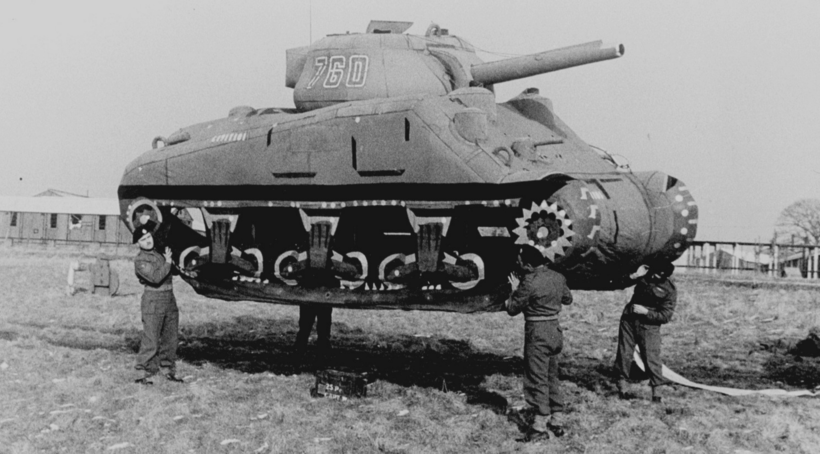ILLINOIS: ‘Ghost’ soldier gets hero’s welcome

In 1944, the 23rd Headquarters Special Troops — better known today as the Ghost Army — swept across Europe from Normandy to the Rhine.
Artists like Schaumburg, Illinois resident Bernie Bluestein were among the recruits for the 1,100-man unit, whose main weapon was deception.
Using inflatable and wooden tanks, trucks, artillery and airplanes, blasting military sound effects over loudspeakers, and sending phony signals to aid their efforts, the Ghost Army acted as decoys, attracting the attention of the enemy while allowing fellow Allied troops to carry out their missions.
In the process, they put themselves in harm’s way.
“That was our mission, to deceive the Germans,” said Bluestein, who has continued his art studies at Harper College for the past 30 years. “If there was a big unit of Germans that were heading toward Americans, we distracted them with our equipment — we would set up our dummies — so they would think that we were the real army. So we were sitting ducks, really.”
“We built imitation things. We built tanks, jeeps, trucks, guns, everything out of wood,” said Bluestein. “And when they took photographs from the air, it looked like the real things.”
Later, the wood decoys were replaced with inflatable rubber dummies.
In September, the 95-year-old Bluestein returned to the scenes of his World War II exploits, as part of a Ghost Army tour. He received a hero’s welcome at stops along the way.
Bernie Bluestein, 95, is a Ghost Army veteran. He was an 18-year-old art student when he joined the super-secret Ghost Army during World War II.
At the Luxembourg American Cemetery, he received a medal from the U.S. Veterans Friends Luxembourg. And in Bastogne, Belgium, he was presented a plaque by the Belgian Army soldiers who now man that historic site.
The two-week tour also visited sites in England, France and Germany. Bluestein was the only Ghost Army soldier on the tour, and is one of only about 20 to 30 of its members still alive.
“The entire trip was just a very emotional trip for me. A once-in-a-lifetime trip for me,” he said.
Bluestein’s son, Keith Bluestein, and Ghost Army historian Rick Beyer also took the tour.
Beyer directed a PBS documentary about the unit and co-authored the book “The Ghost Army of World War II,” that brought the anonymous heroes out of the shadows.
“I think the major contribution of the Ghost Army is that they may have saved thousands of lives, because by deceiving the Germans about where an attack would take place or deceiving them about where American forces were weak, they may have prevented battles that might have killed thousands of people,” he said.
Article Source : https://www.studentnewsdaily.com/daily-news-article/veterans-day-2018-bells-to-ring-100-years-after-the-end-of-wwi/
ImageSource: https://www.studentnewsdaily.com/wp-content/uploads/2018/11/veterans-day-bells-820x548.jpeg" class="img-thumbnail" alt="Veterans Day 2018 – Bells to ring 100 years after the end of WWI
VOCABULARY WORDS
1.Deception/ noun : the action of deceiving someone.
2.Inflatable/adjective : capable of being filled with air.
3.Artillery /noun : large-caliber guns used in warfare on land.
4.Distracted /adjective : unable to concentrate because one's mind is preoccupied.
5.Equipment /noun : the necessary items for a particular purpose.
6.Dummy /noun : a model or replica of a human being.
7.Exploit/ verb : make full use of and derive benefit from (a resource).
8.Plaque /noun : an ornamental tablet, typically of metal, porcelain, or wood, that is fixed to a wall or other surface in commemoration of a person or event.
QUESTIONS
1. What was the purpose of the Ghost Army in WWII?
2. Describe the type of equipment the Ghost Army used to fool the Germans.
3. How dangerous was the Ghost Army’s mission?
4. Why does Ghost Army historian Rick Beyer, who wrote a book and directed a PBS documentary about the unit, think they saved thousands of lives?
5.The soldiers in this unit were ordered not to tell anyone about their mission. It was kept a secret for decades.
a) Do you think it should have been made public? Why or why not?
b) What is your reaction to the fact that the 1,100 soldiers and others involved kept it secret for so many years?